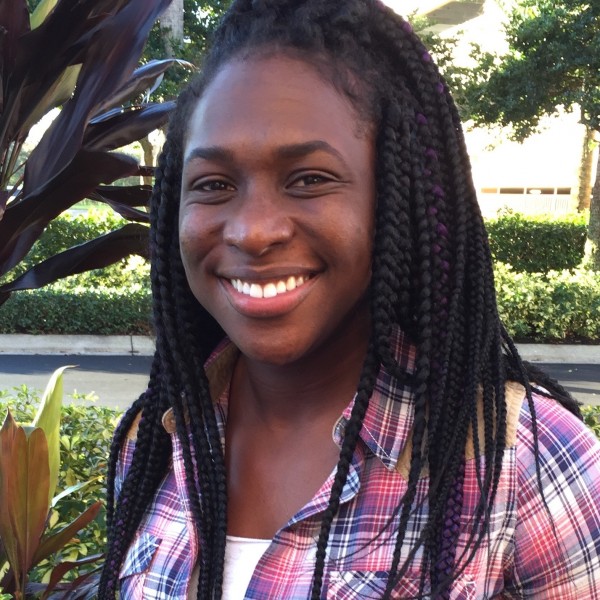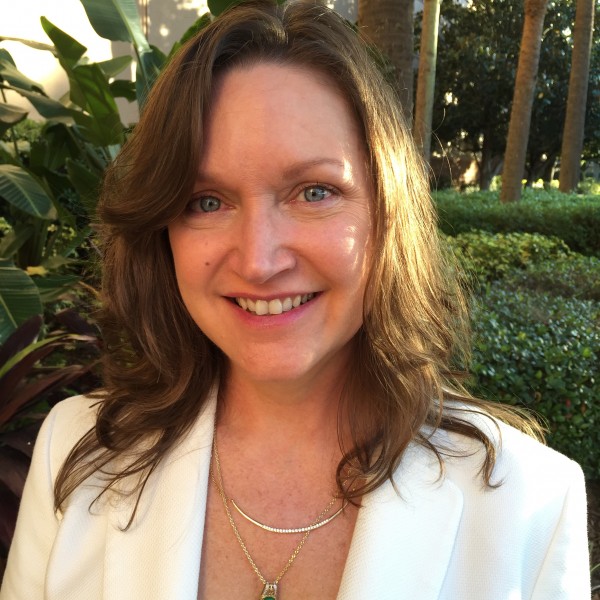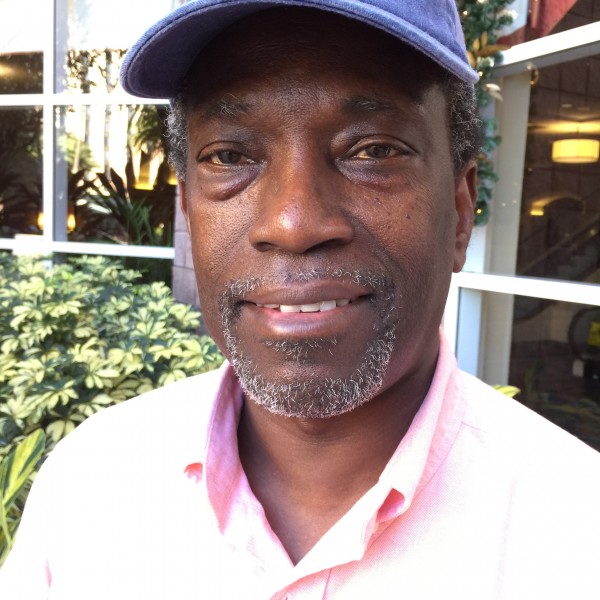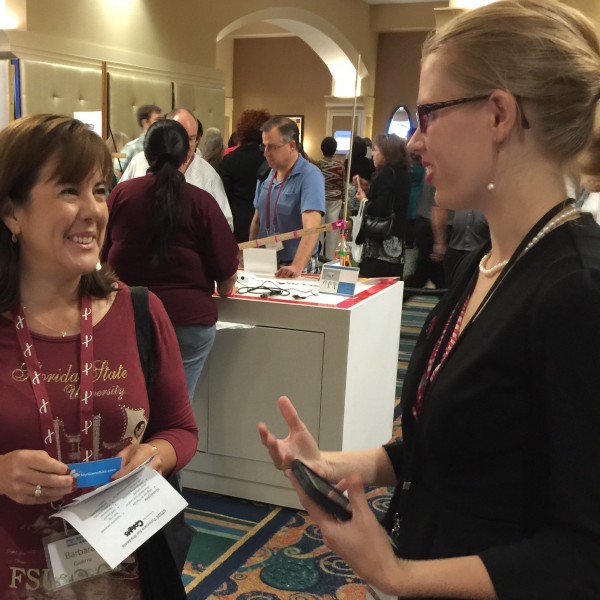Florida teachers learn about latest in STEM research and network with experts at the FCR–STEM Conference

Tiaerra McLaurin teaches at Ed White High
School in Jacksonville
Hundreds of Florida teachers gathered in Orlando December 10-12 for the biggest STEM education conference in the state, the FCR–STEM Conference, held by the Florida Center for Research in Science, Technology, Engineering and Mathematics.
For K-12 math and science teachers, the conference provided both an opportunity for high-quality professional development and a chance to engage world-class researchers and experts who shared the latest developments in STEM education.
“Being a second-year teacher, I’ve learned a lot of teaching practices that I will use in my classroom,” said Tiaerra McLaurin, who teaches biology, marine science and environmental science as part of the Bridge to Success program at Ed White High School in Jacksonville. “And I met with colleagues from the FCR–STEMLearn class this summer, so that was really, really awesome.”
McLaurin also got to know “Urban Science: Doing Research on School Grounds” presenter John Enz, a biology professor at Jacksonville University, who offered to help her out with field trips. “We have limited resources, so it is hard to do labs and field trips,” McLaurin said. “He said to send him an e-mail and we will figure something out.”
This is the kind of interaction FCR–STEM hopes teachers gain from the conference, said Rabieh Razzouk, acting director of FCR–STEM, which was created by the Florida Legislature and established at Florida State University. “We designed the FCR-STEM Conference to put teachers shoulder-to-shoulder with university faculty and other experts in their fields,” Razzouk, said. “This is part of FCR–STEM’s commitment to providing Florida’s math and science teachers with the highest quality professional development.”
The FCR–STEM Conference offered teachers more than 60 unique sessions to stimulate thinking across a range of subject areas and grade levels, from urban science to 3-D printing to Florida’s fossil record.
“Our emphasis is on providing Florida’s science and mathematics teachers with professional-development experiences they can carry into the classroom to enhance the learning of their students,” Razzouk said.

Franki Hurlburt teaches at Palmetto Middle
School in Dade County
This was the case for Franki Hurlburt of Palmetto Middle School in Dade County. “It has been really interesting to attend different workshops, not just math workshops — I’m a math teacher — but to explore some areas in science,” Hurlbert said. “I think that that is going to help me take something back to the students to incorporate some real-life applications of the math that we are learning so that students can see it’s not just about paper-and-pencil math but about problems in the real world…. Math and science are such a natural fit, but I need help to bring that to my students.”
Many teachers took advantage of the opportunity to learn more about CPALMS, the powerful web-based system, designed by FCR–STEM, that offers teachers more than 11,000 free lessons and other instructional resources vetted by content and teacher experts plus online tools to support teachers’ planning and instruction.
“I have most enjoyed attending discussions on CPALMS,” said Betsy Navin, a third-grade teacher at St. Anthony Catholic School in San Antonio, in Pasco County. “There are so many resources that we can utilize across the subject level. With each session I attend, they go into more and more detail into how we are going to be able to use these in the classroom. I was very impressed with the student tutorials and the formative assessments we can use in math.”

Eddie Butler teaches at McArthur High School in
Broward County
Eddie Butler of McArthur High School in Broward County was impressed with what he learned about CPALMS. “I really enjoyed the conference,” said Butler, who teaches biology and, in some years, chemistry. “It was exceptionally well done. I wouldn’t mind coming back next year to learn more, especially about CPALMS, which is an opportunity to help my students out and give them a heads-up on how they can achieve and do well in class.”
Other teachers explored the STEM fields to prepare for curriculum enhancements at their schools.
“I’m here to solidify our vision for the STEM program for our school,” said Barbara Guerra, a curriculum coordinator at Blessed Trinity Catholic School in Ocala. “We are actually STREAM, because we incorporate the religion and the arts to the STEM. I need to find resources and curriculum.”
For Guerra, the conference provided an abundant source of ideas and resources for her and her school. “Next year will be the first we have a STEM program, and that’s very exciting,” she said. “It is extremely helpful to have all the different workshops offered. CPALMS has been fantastic. It is a great resource that is under-utilized, at least in our school.”

Barbara Guerra, a curriculum coordinator at
Blessed Trinity Catholic School in Ocala, learns
about using 3-D printing in STEM classes from
Hannah Olson of MyStemKits.com, at the
FCR–STEM Conference in Orlando.
Guerra said the FCR–STEM Conference allowed her to get a lot accomplished in just a few days. “To have everything STEM-related under one roof is a great, great opportunity to just shop, and know, and learn and even for our teachers seeking professional development next year,” she said. “I’m excited. This is our first time.”
In addition to the presentations and workshops, teachers heard addresses from three prominent keynote speakers:
• Vice Admiral Jan Tighe, commander of the U.S. Fleet Cyber Command/U.S. 10th Fleet, spoke on “Women in STEM: The Navy’s Cyber Commander and how STEM Shaped Her Career.”
• DeWitt Sumners, distinguished professor emeritus of mathematics at Florida State University, spoke on the mathematics of DNA in his address, “Calculating the Secrets of Life.”
• Bruce Means, president of the Coastal Plains Institute and Land Conservancy and a renown biologist, talked about “Priceless Florida: Natural Ecosystems and Native Species.”
At the conference, Razzouk announced that the next FCR–STEM Conference will be August 2-4, 2016.
To learn more about the FCR–STEM Conference, see conference.fcrstem.org.
The Florida Center for Research in Science, Technology, Engineering and Mathematics is a multidisciplinary research center created by the Florida Legislature and competitively awarded to Florida State University in 2007. The center’s mission is to help the State of Florida improve STEM teaching and learning in grades K-12 and prepare students for higher education and STEM careers in the 21st century.
